Introduction
Hello! How are you?
My name is Carlos Cateb, and I have been working in the field of fetal and pediatric cardiology for 35 years alongside my wife, Dr. Lilian Lopes, who is also an expert in these subjects. Together, we are partners in ECOKID, a nationally renowned clinic that has been established in the market for 28 years. I am reaching out to introduce our project “In the Heart of Brazil – Fetal and Pediatric Hearts”, which aims to extend access to cardiac health care to children, pregnant women, and adults with congenital heart disease in indigenous communities that currently lack access to such care.
We know that out of every 100 live births, one child is born with congenital heart disease, and early diagnosis directly affects the chances of treatment, as well as the child’s survival and life quality. The advances in pediatric cardiac surgery and other available treatments have had a profound impact on the management of these cases in recent years, greatly increasing the life expectancy of these children, most of whom now reach adulthood with a good quality of life. However, this new reality has yet to extend to groups throughout Brazil that remain without access to cardiac evaluations or diagnostic exams, such as an echocardiogram.


Project Start
To begin, we have chosen an indigenous community called Kyikatêjê, of the Gavião people. This community belongs to the Mãe Maria Indigenous Land (IL), located in the southeast of the state of Pará, in the city of Marabá.

Project
A team consisting of 3 doctors and a nurse will accompany me to indigenous communities to provide fetal (for pregnant women) and pediatric (for children ages 0-15) cardiology care, as well as echocardiography and electrocardiography exams, in order to diagnose possible congenital heart disease.

Reason for selection
We selected the Mãe Maria Indigenous Land (IL), specifically for its interesting characteristics. There are approximately 22 communities with around 2,500 indigenous people, spread across 67,000 hectares of the Amazon Rainforest. Each community has its own routines and commands (chiefs and leaders). We will also conduct a census to determine how many children ages 0-15 live in each individual village. Access to the communities will not be a problem, as I am baptized Gavião (Hawk) and consider myself one of them.
Project Development
Our team plans to travel to indigenous communities to perform cardiology exams on pregnant women and children. To accomplish this, we will bring two portable echocardiography machines and an electrocardiogram, along with three doctors and a nurse. We have already received all the necessary donations for the pilot project, but we still require additional donations for the next excursions that will take place every other month
- Three to four airline tickets, with prices ranging from approximately R$ 1,800 to R$ 2,500 each;
- Daily fee for the echocardiography specialist, which ranges from R$800 to R$4,000 per day depending on the number of days needed to perform the exams;
- Daily fee for a nurse or nursing assistant, which ranges from R$ 300 to R$ 1,500 per day;
- The approximate cost for each trip will be R$ 25,500;
- I will participate at every action, covering my own expenses.When Dr. Lilian Lopes participates of the actions, she will also cover her expenses, waiving the daily fees and tickets;
- Equipment insurance, leases, expenses with luggage dispatches and a series of other expenses;
- The government will cover internal transportation to the villages, whether by plane, boat, or 4x4 vehicle, ensuring safety and meals for our team.
Thank you for your attention. Let’s work towards a healthier Brazil!
Scan the QR code
on the side for
any questions.
YOU CAN DONATE AS MUCH AS YOU HAVE OR AS MUCH AS YOU WANT!
Dollar reference BRL 5.10


ARE YOU A DOCTOR?
Sign up in the form below to understand how you can help the project and be part of this cause!
ARE YOU A COMPANY OR INDIVIDUAL?
Help us raise funds to encourage the project and make a difference in the world!

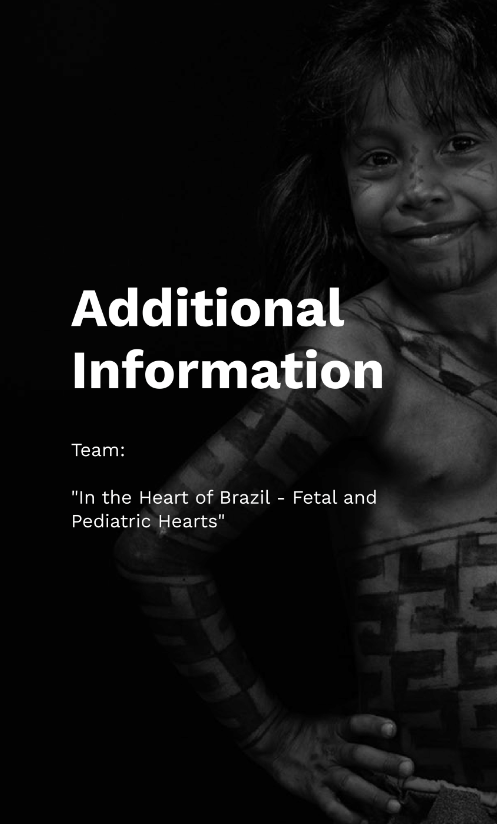
Medical Coordination:
Dra. Lilian Lopes
Dra. Glaucia Moreira
Dr. Fabrício Camargo
Organization:
Carlos Cateb
Medical Team**
Dra. Amanda Regina Camboim
Dra. Ana Gabriela Zandonaide
Dra. Heloísa Maria Khader
Nursing Assistant:
Darlyng Fabiana
Hakakwyigavia Haraxare
Non-Medical Coordination:
Concita Konxarti
Hakakwyi Haraxare
Pytàwà Warhyti Tembé
Carlos Cateb
Nurse Responsible:
Anne Cleria
Support:
Dra. Karen Gamboa
Secretary:
Aline Pinto
Information Technology:
Patrick Fernandes
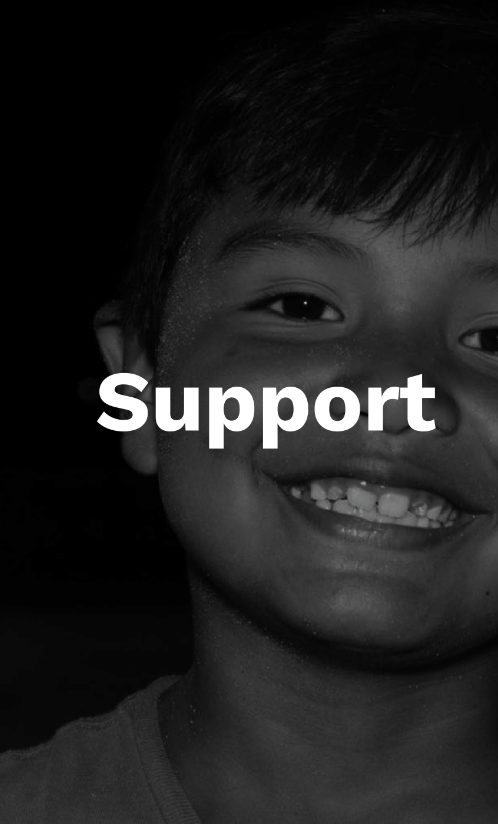


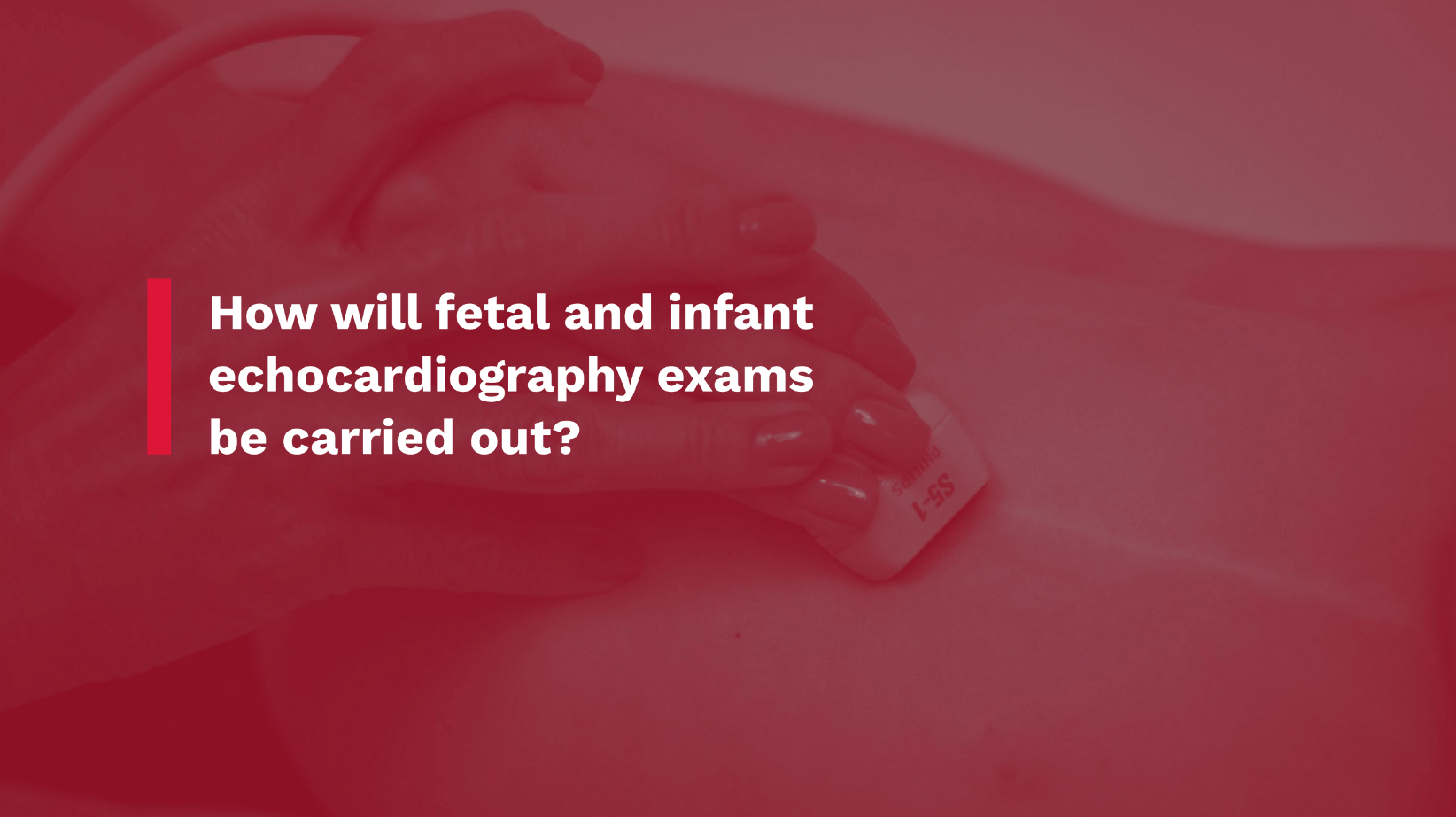
What is Congenital Heart Disease
Congenital heart disease refers to any abnormality in the structure or function of the heart that occurs during the first eight weeks of pregnancy when the baby’s heart is forming. It occurs due to a disturbance in the embryonic development of the cardiac structure, even if it is discovered at birth or years later. According to data from the Brazilian Society of Cardiology, approximately 29,000 children are born with heart problems in Brazil each year, meaning that out of every 100 live births, one baby is born with a heart defect. Of these, around 80% will require some form of cardiac surgery during their evolution.
Congenital heart disease can cause symptoms at birth, during childhood, or only in adulthood. In some cases, congenital heart disease does not cause any symptoms. There are different types of heart disease, ranging from mild and only discovered in adulthood, to more severe forms, such as cyanotic heart disease, which can cause blood flow abnormalities to the body.
How the Exam is Performed:
The echocardiogram is an exam performed using an ultrasound device. The device captures sound waves and transforms them into images. To perform the echocardiogram, the patient will be positioned on its back, and then a specialized cardiologist will slide a transducer with gel over the patient’s chest to visualize all parts of the heart. The gel makes visualization easier, is water-based, and does not cause any skin allergies. At times, slight pressure may be applied to facilitate the visualization of the organ and the functionalities that need to be tested, without causing pain or discomfort to the patient. The rocedure typically takes about 20 minutes. However, the steps may vary depending on the type of echocardiogram.
Preparation for the Echocardiogram:
In general, no preparation is required before the exam.
Equipment:
The equipment to be used is the ultrasound (images are merely illustrative). They look like a notebook, but are powerful, precise, and reliable. Depending on the configuration, it can cost up to 200,000 reais.
Contraindications:
There are no contraindications for performing an echocardiogram. No pain or side effects!
How the Fetal and Infant Examination will be conducted:
• Patients will be attended in order of arrival;
• They will be identified on the echocardiography equipment and in a form with their name, age, village, height, weight, parents’ names, and if there are any symptoms;
• Each exam should have a minimum of 12 heart capture images with the necessary measures;
• If we find patients with altered hearts, parents will be called along with the Chief or leaders, and the doctor will provide a detailed explanation, directing the patient to the necessary steps;
• The exams will only be downloaded from the equipment upon return to São Paulo, placed in the system, and made permanently available to the patient through the website;
• At the end of the exam, the child will receive a card with the following information: that they underwent a cardiological evaluation with echocardiography and electrocardiogram.
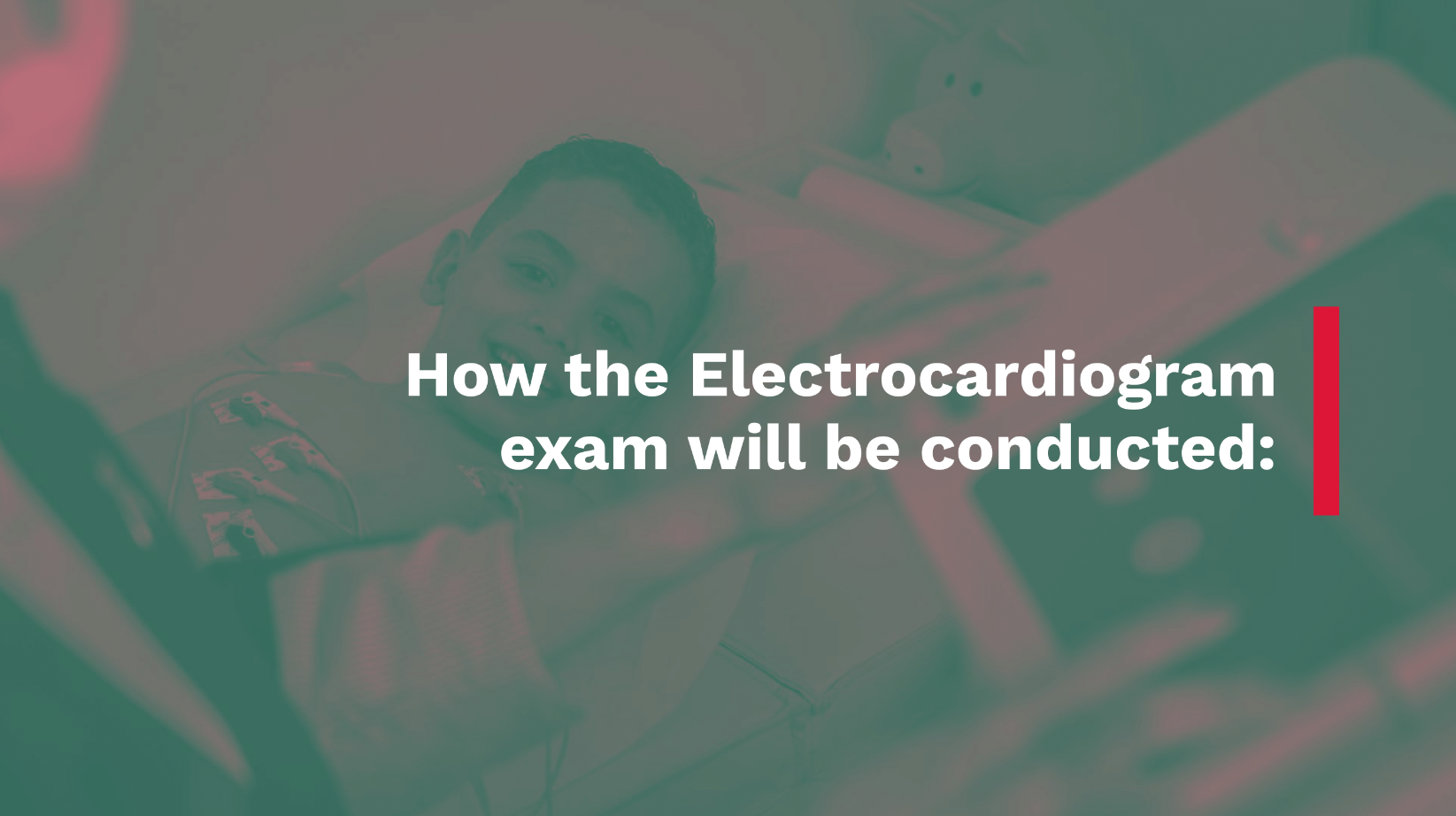
Electrocardiogram (ECG) is an exam that records the electrical activity originating from the heart, captured through the placement of electrodes applied to the patient’s skin and displayed in graphical format.
What is the Electrocardiogram for:
The Electrocardiogram is an initial exam for evaluating cardiovascular health, aimed at detecting some heart abnormalities. Also known as ECG, it is also requested by cardiologists to monitor the progression of some diseases, as well as to evaluate the effectiveness of medications for arrhythmia or pacemakers.
Preparation for the Electrocardiogram exam:
In general, no preparation is necessary before the exam.
Service:
It serves all ages and both sexes.
Contraindications:
There are no contraindications for the Electrocardiogram exam.
ARE YOU A DOCTOR?
Sign up in the form below to understand how you can help the project and be part of this cause!
ARE YOU A COMPANY OR INDIVIDUAL?
Help us raise funds to encourage the project and make a difference in the world!
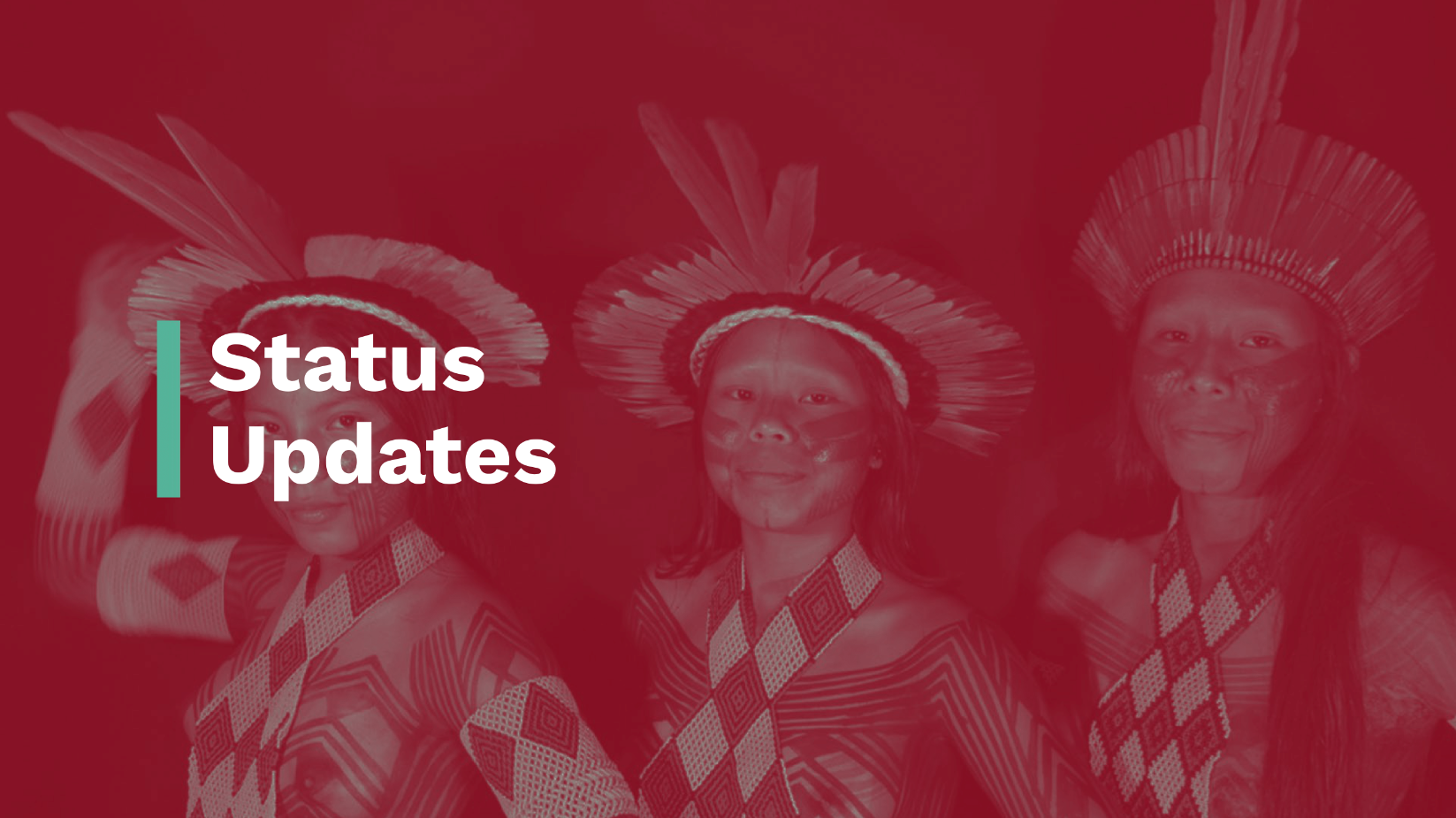

Feb, 3 - 2023
During an informal lunch with Minister of Indigenous Peoples Sonia Guajajara, I presented the project “In the Heart of Brazil”. Immediately, the Minister instructed her assistant Ana Patté to forward the project to the appropriate parties.

Feb, 4 - 2023
At an event for the Pre-March of Indigenous Women, I presented the project “In the Heart of Brazil” to Puyr Tembé, former president of the State Federation of Indigenous Peoples of Pará and now Secretary of Indigenous Peoples of the State of Pará, who immediately supported the project.

Feb, 5 - 2023
I was introduced to Dr. Putira Sacuena from the Indigenous Health Secretariat of the State of Pará. After presenting the project, it was approved by her with great enthusiasm to put it into practice, especially in the Mudurucu, Kayapo, Parakana, and Xicrin do Catete villages, where illegal mining is present. As some villages are difficult to access, she raised the possibility of providing internal transportation by car, boat, and airplane, as well as food, lodging, and security, and the need to call upon the National Force.

Feb, 5 - 2023
Welcomed by the lawyer, indigenous activist, and Indigenous Health Secretary of SESAI (Special Secretariat for Indigenous Health), who, after reading the project, forwarded it to the responsible party.

Feb, 05 - 2023
Chief Pepkrakte Konxarti and his wife, indigenous activist Concita Söpré, from the Kyikatege village, where we will make the first incursion of the project, from May 07 to May 13, 2023.

March, 21 - 23
With the General Coordination of Management and Legal Team of SESAI, who defined: for each incursion, the medical team must undergo training on the ethnic group to be visited and will provide me with a position by the end of the month.

March, 21 - 23
Anna Patté, Parliamentary Advisor to Minister Sônia Guajajara, who said: It’s a done deal!

Curriculum Dra. Lilian Lopes
Lilian Lopes, born in Santo, SP, on April 2, 1958. Married, holder of identity card number 9576707-1 and CPF 891 459 928 – 00. Address: Alameda Santos, 211, Conjunto 1307, Paraiso – CEP 01419 000, São Paulo – SP. Phone: 3254 1010 / 5084-0825.
From 1976 to 1981, Dr. Lilian attended the School of Medical Sciences of Sorocaba at the Pontifical Catholic University of São Paulo, Sorocaba. Medical License – CRM 42497. Graduated on December 11th, 1981.
From 1980 to 1981, she completed a voluntary internship at the Intensive Care Unit of the Sociedade Beneficência Portuguesa de São Paulo-Hospital São Joaquim, and in the Cardiac Surgery Service of Professor Dr. Adib Jatene.
Between 1982 and 1983, she completed a Medical Residency at the “Dante Pazzaneze” Institute of Cardiology in the state of São Paulo, obtaining a Specialist Certificate in Cardiology (conferred by the medical residency commission in accordance with law 6.932/81).
In 1984, she obtained a Certificate of Improvement in Pediatric Cardiology, as a Medical Resident at the “Dante Pazzaneze” Institute of Cardiology in the state of São Paulo.
From August to December 1985, she was a medical intern in the Pediatric Cardiology Department at The Children’s Hospital of Harvard Medical School/Boston, under the supervision of Dr. Bernard Nadal and Dr. Aldo Castaneda. During the same period at the same university, she
took a course in Pathological Anatomy with Dr. Richard Van Praagh and Dr. Stella Van Praah and a course in pediatric Eco-Doppler Cardiology with Dr. Stephen Sanders.
From January to December 1986, she was a research fellow in the Pediatric and Fetal Echocardiography laboratory at the CardioVascular Research Institute of the University of California/San Francisco, under the supervision of Dr. Norman H. Silverman.
In 1987, she began her research activities in echocardiography and fetal cardiology as a research physician at the Obstetrics Clinic of FMUSP and was hired as an assistant physician by the Foundation for the Faculty of Medicine of USP in January 1992, a position she has held to the present day.
In July 1989, she did an update internship in pediatric and fetal echocardiography at the University of California/San Francisco, under the supervision of Dr. Norman H. Silverman.
In August 1989, she was invited to take over the direction of the Pediatric and Fetal Echocardiography Service at the Beneficência Portuguesa de São Paulo Society – Hospital São Joaquim, where she still works to this day.

May 03, 1991
Cardiology Specialist title conferred by the Brazilian Medical Association and the Brazilian Society of Cardiology.
November 01, 1991
Echocardiography Specialist title conferred by the Echocardiography Department of the Brazilian Society of Cardiology.
December 12, 1994
Echocardiography Certification conferred by the Brazilian Medical Association, the Brazilian Society of Cardiology, and the Echocardiography Department.
February 1995
Dr. Lilian founded the ECOKID clinic.
May 24, 1995
She was approved with "Honors" in her doctoral thesis defense in the Obstetrics and Gynecology concentration area, presented at the Faculty of the University of São Paulo, on "FETAL TACHYARRHYTHMIAS.'I
December 17, 1998
Pediatric Cardiology Habilitation title (by proficiency), conferred in accordance with the determination of the Parity Commission of the Pediatric Cardiology Department of the Brazilian Society of Cardiology and the Cardiology Department of the Brazilian Society of Pediatrics.
Head of the Fetal Cardiology Department at the Obstetrics Clinic of FMUSP for 28 years, the first Fetal Cardiology service in the country.
2015
In 2015, Dr. Lilian founded the Lilian Lopes Institute
ARE YOU A DOCTOR?
Sign up in the form below to understand how you can help the project and be part of this cause!
ARE YOU A COMPANY OR INDIVIDUAL?
Help us raise funds to encourage the project and make a difference in the world!


